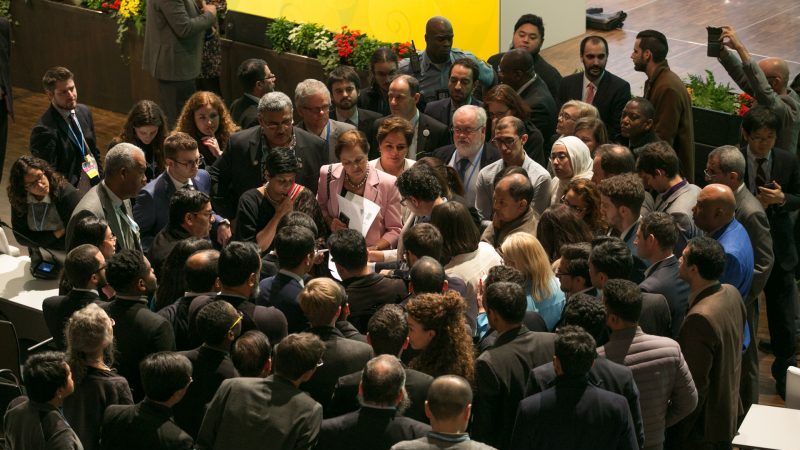With a month to go to UN climate talks in Katowice, it’s time to start managing expectations.
NGOs are calling for clear commitments for countries to raise their carbon-cutting ambition before 2020 – see this blog from the World Resources Institute for the nuts and bolts.
But as Sara Stefanini reports, the political mood music is none too upbeat. Brazil’s election result and Germany’s leadership vacuum are the latest signs of the alliance that forged the Paris Agreement in 2015 drifting apart.
Last week’s pre-Cop meeting of 40 key delegations in Krakow focused on completing the rulebook for the Paris Agreement, according to participants.
“We are still facing an enormous challenge. We now have to work on hundreds of pages of difficult, technical text we are negotiating,” said Cop24 president Michał Kurtyka in a statement.
Laurence Tubiana, head of the European Climate Foundation, told Climate Home News she was “not pessimistic” about delivering on the technical goal. “Where I have more concern is that we know that we have to ramp up ambition, that countries have to revise their ambition by 2020,” she said. “So what we have to get in Katowice, which is not totally done, is the hope, the pathway where countries revise their contribution to 2030 with a decarbonisation plan for 2050 – all this we need to work at.”
Even perennial optimist and former UN climate chief Christiana Figueres – now outside the UN process – is playing down the political aspects. “Katowice or Cop24 is very much a technical Cop. The rulebook has to be ironed out… in order to give way to a more political year that will be next year,” she said.
Island changeover
In this context, Thoriq Ibrahim, outgoing environment minister for the Maldives and chair of the Alliance of Small Island States (Aosis), is mooting a change in strategy.
Islands, vulnerable to rising seas, drought and intensifying storms, drove the inclusion of 1.5C as the aspirational global warming limit in the Paris Agreement. That led to the commissioning of an Intergovernmental Panel on Climate Change special report on the science.
Now the report has shown the world could cross the 1.5C threshold in 11 years, he argues, “we must now devote at least as much energy to securing our priorities on adaptation and loss and damage as we do on mitigation ambition”. That means pushing the developed world to support those hardest hit by climate change impacts.
It remains to be seen whether the new government of the Maldives – former president and climate activist Mohamed Nasheed’s party is back in power – or Belize, the next chair of Aosis, take Ibrahim’s advice.
Quick hits
- Zero emissions cement by 2050 is technically feasible: Swiss researchers set out how in a report
- Gas power generators in California face credit rating downgrades as a result of the state’s 100% renewables plan
- Coal is a public health emergency, according to an anti-air pollution campaign launched by Christiana Figueres
- Client Earth is suing Polish utility Enea over the “indefensible” financial risks associated with its new coal plant investment
Go deeper
If you have half an hour this weekend, immerse yourself in Reuters’ investigation into the effects of climate change on marine life. Ocean Shock covers stories ranging from New England’s lobster boom-and-bust to rapacious shrimp farming in Borneo and the future of seafood.
Brazil’s Jair Bolsonaro is the environmental story of 2018.
No-one is better positioned than CHN’s Fabiano Maisonnave to cover the impact of his presidency on the world’s most important forest. We are the only international news site with a correspondent living in the heart of the Amazon. You can read some of the great reporting Fabiano has already done for us here.
We know we need to keep on this story, but after a huge 2018 and with the biggest UNFCCC talks in years approaching, our resources are really stretched. Please help us to keep Fabiano writing by making a small donation through our Patreon account.
